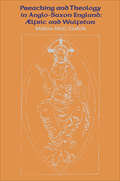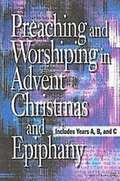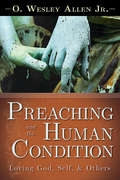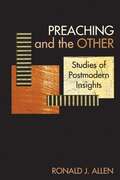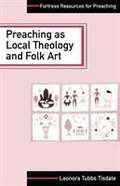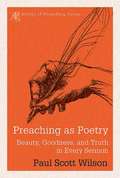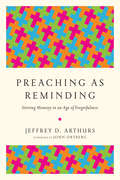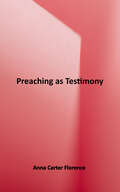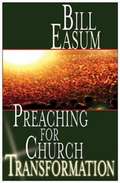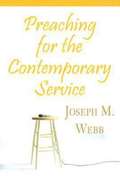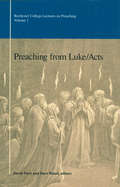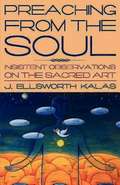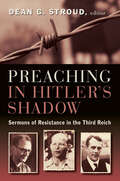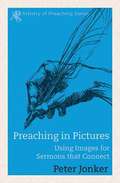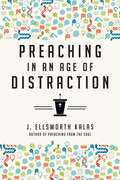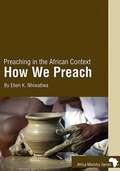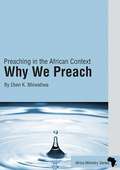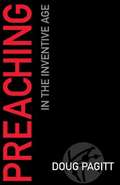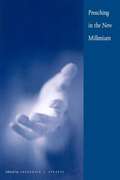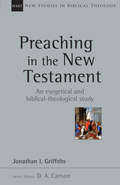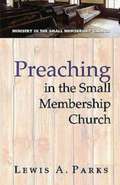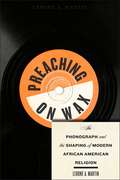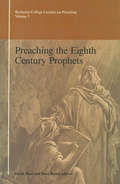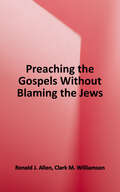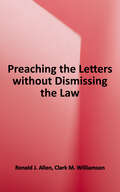- Table View
- List View
Preaching and Theology in Anglo-Saxon England: Ælfric and Wulfstan
by Milton Mcc. GatchIn Preaching and Theology in Anglo-Saxon England, Professor Gatch deals with two aspects of the writings of Ælfric and Wulfstan that have been hitherto ignored by scholars of the period. First, he investigates the uses for which the two homilists prepared their sermons, analysing the homiliaries of the Carolingian church and its legislation concerning preaching and teaching, and showing that one should look not to the model of patristic preaching but to the development, in the place of exegetical preaching, of a vernacular catechetical office, the Prone. He also considers the evidence from England in the time of Ælfric and Wulfstan, distinguishing a number of uses which Ælfric intended for his homiletic materials, but questioning whether users of Ælfric's work (Wulfstan perhaps among them) understood or accepted the basic homiletic practices that the abbot had in mind. Second, Gatch investigates the eschatological teaching of the homilists as specimen of the over-all content of their sermons and as indicator of their theological method. By throwing their work into relief against the background of the anonymous Old English homilists, he gives a more accurate picture than exists in textbook stereotypes of the beliefs of Ælfric and Wulfstan, and also of the general theological scene in England at the turn of the tenth and eleventh centuries. The first complete edition of Ælfric's Latin epitome of Julian of Toledo's Prognosticon futuri saeculi, one of the most important of Ælfric's theological sources, is appended to the text. This interdisciplinary study is an important addition to our knowledge of Anglo-Saxon culture and medieval church history, and a major contribution to the study of Old English homilies. For the uninitiated, it is an excellent introduction to Old English preaching; for the initiated, it opens a new field for investigation.
Preaching and Worshiping in Advent, Christmas, and Epiphany - eBook [ePub]: Years A, B, and C
by AbingdonThis helpful one-volume commentary resource provides brief preaching commentaries and prayers for worship for the first Sunday in Advent through Epiphany of the Lord (Years A, B, and C). This book includes: lectionary readings for each Sunday and Holy Day in the season; three sermon briefs for each Sunday in Advent and the Sunday after Christmas; sermon briefs for Christmas, Christmas Eve, and the Day of Epiphany; creative prayers for each Sunday and Holy Day in the season; scripture index.
Preaching and the Human Condition: Loving God, Self, & Others
by O. Wesley Allen Jr.In the wake of Enlightenment emphasis on the individual and confidence in human progress/ability, sermons often suffer from a lack of adequate analysis and presentation of the human condition. The result is that preachers either 1. (intentionally or unintentionally) offer self-help type messages or 2. fail to help hearers experience the breadth of the good news of Jesus Christ because the "bad news" of the world is not presented with weight. In this work, the author proposes to use the pericope in which Jesus is asked about the greatest commandment (Mk 12:28-31) as a lens for preachers exploring the human condition cumulatively from three different perspectives across the course of their preaching week in and week out. "Love God" suggests a perspective in which the human condition is seen in relation to a broken relationship between humanity and God (vertical). "Love neighbor" suggests a perspective in which the broken relationship is between humans and others (horizontal). And "as yourself" suggests a brokenness in relationship to one's self (inner). While different theological schools have emphasized these perspectives differently as the starting points for their anthropology, views of sin,etc., all schools include all three perspectives. In individual chapters, the author will unpack these three perspectives theologically, move to suggest practical homiletical approaches to preaching in relation to each perspective, and provide a sample sermon dealing with that perspective.
Preaching and the Other: Studies Of Postmodern Insights
by Ronald J. AllenPreaching and the Other introduces the reader to six major themes characteristic of the postmodern era that are important for preaching and explains their implications.
Preaching as Local Theology and Folk Art
by Leonora TisdaleIllustrated throughout by cases of the author and others, this book tells how to analyze a congregation so that the preacher's sermon really fits his audience. The book then gives practical help for preparing and delivering sermons that are meaningful and appropriate. Tisdale draws from contextual theology and congregational studies.
Preaching as Poetry: Beauty, Goodness, and Truth in Every Sermon (The Artistry of Preaching Series)
by Paul Scott WilsonIt is tempting for preachers in this digital age of plurality and diversity to offer quick sound bites and PowerPoint-style presentations. These tend to invite a yes or no response, as in mathematical equations. But if we are to reach Christians across the theological spectrumandinvite non-Christians to seriously consider our faith, we must take a different approach. What is needed is greater attention to poetry and images meant to communicate the beauty of the faith and the wonder and mystery of God in everyday life. We must communicate the unity of our message of faith, the divine as truth, and justice and healing as expressions of God. Preaching as poetry (theopoetic preaching) allows for the bold imagery of scripture and the gentle invitation of art. Sermons can no longer always be neatly tied up, perfectly linear, with complete answers to every question. In Preaching as Poetry Paul Scott Wilson teaches why this new approach is necessary today, and demonstrates with multiple examples how it works in real sermons. He skillfully guides the reader to incorporate the classical values of beauty, goodness and truth in every sermon, and in ways that connect with congregants and listeners today.
Preaching as Reminding: Stirring Memory in an Age of Forgetfulness
by Jeffrey D. ArthursWe know of the preacher’s roles as both teacher and proclaimer, but Jeffrey Arthurs adds another assignment: the Lord’s remembrancer. With decades of preaching experience, he explains how to stir the memory of Christ-followers, fanning the flames of faith through vivid language, story, delivery, and ceremony. When knowledge fades and conviction cools, the church needs to be reminded of the great truths of the faith.
Preaching as Testimony
by Anna Carter FlorenceBy exploring the historical, theoretical, and practical elements of the tradition of testimony, Anna Carter Florence seeks in this much-anticipated book to establish the historical and contemporary validity of women's preaching and to introduce testimony to a new generation of preachers and teachers. She begins with the stories of three women whose preaching was often described as testimony: Anne Marbury Hutchinson, Sarah Osborn, and Jarena Lee. Then, she examines biblical and theological perspectives on testimony. Finally, she explores how testimony plays out in a preacher's life, offering constructive proposals for preaching as well as helpful guidelines, direction, and exercises.
Preaching for Church Transformation
by Bill EasumBefore he was one of the best-known church consultants in the country, Bill Easum served a lengthy pastorate in San Antonio, Texas. When he arrived at the church it was in serious decline, with the possibility of having to close its doors beginning to loom over it. By the time he left it was the most vibrant, fastest-growing congregation in its city and region. Shortly after he arrived, Easum preached a series of sermons on the book of Acts that challenged the congregation to become an authentic New Testament church. He called on parishioners to step out of their comfort zones, stop expecting their pastor to be a personal chaplain, and join together to reach their city with the message of Jesus. Preaching for Church Transformation provides updated versions of the sermons Easum preached as he issued this challenge to the congregation shortly after his arrival. Interspersed with the sermons is commentary telling the reader how to adapt them for her or his own situation. Anyone wanting to lead a congregation from the status quo to growth and faithful witness will find Preaching for Church Transformation an indispensable resource.
Preaching for the Contemporary Service
by Joseph M. WebbPreaching for the Contemporary Service is a guide to releasing the energy and creativity of the contemporary worship service within the sermon. Is the traditional sermon still relevant in contemporary worship settings or is it hopelessly out of place? Joseph Webb shows how improvisational preaching taps into the spontaneity of today's worship to engage audiences with the good news of Jesus Christ.To read a sample from the book click here"Joe Webb grieves that much contemporary worship yawns at traditional preaching and pleads for a new kind of improvisational preaching that does justice to the biblical story and connects emotionally with today's listeners. Carefully explaining both strengths and dangers of improvisation, he draws on insights from theater and movie-making with much practical advice for planning improvisation. A lively and stimulating book to be taken seriously by any who would preach in contemporary services." --Michael J. Quicke, Professor of Preaching, Northern Seminary, and author of 360-Degree Preaching"Joseph Webb has devoted his lifetime to the craft and mission of preaching. He brings fresh and cutting-edge insight with the wisdom of a sage and the foresight of a prophet to a whole new emerging generation of communicators." --Gene Appel, Lead Pastor, Willow Creek Community Church"Bull's-eye! Joe Webb's theory of improvisational preaching hits the target for effective communication in the digital age. And here's why I love it: Lots of people will tell me what to do; Joe shows me how!" --Tommy Kiedis, Teaching Pastor, Memorial Presbyterian Church, and Director of Leadership Development, Reformed Theological Seminary“This book shows us how to improvise our preaching without compromising the Scripture, a welcome help to those of us working to revitalize the worship of the church.”--Kenton C. Anderson, ACTS Seminaries of Trinity Western UniversityJoseph M. Webb is Dean of the School of Communication & Media and Professor of Global Media and Communications at Palm Beach Atlantic University. He has taught seminary courses in homiletics, and speech and communication classes at colleges and universities. He is the author of Preaching Without Notes, also published by Abingdon Press.
Preaching from Luke/Acts: Preaching From Luke/acts (The\rochester College Lectures On Preaching Ser. #Vol. 1)
by David Fleer Dave BlandThe context for this book is rooted in the life of the local church. We desire to integrate biblical scholarship and homiletical theory with the task of preaching Luke/Acts. Our prayer is that the responsible integration of these resources will increase the ability of the Holy Spirit to empower preachers for faithful proclamation of God's word. To that end we give God the glory.- From the editor's Introduction.
Preaching from the Soul: Insistent Observations on the Sacred Art
by J. Ellsworth KalasCareful biblical interpretation; insights into contemporary life; polished delivery; humorous anecdotes; these are the building blocks of preaching that genuinely reach people. Right? Wrong, says Ellsworth Kalas. We have all encountered preachers who seem to know all the fine points of exegesis and inflection, yet whose sermons leave us surprisingly unmoved, aware that we were in the presence of good speaking, but not great preaching. The difference, Kalas reminds us, lies in that hard-to-describe, yet essential quality known as soul. Soul is the collection of those perspectives and convictions that matter most to the preacher. Soul preaching means offering one's particular ideas, attitudes, and convictions fully to the congregation. When one preaches with soul, one engages the biblical text with the core of one's values and beliefs. Soul preaching is, in other words, simply giving the whole self to the task of proclamation. While the concept may sound simple, the reality is anything but. In the clear, insightful style for which he is known, Kalas takes readers on a path of discovery, introducing them to the unique gifts that they can bring to preaching, and the best way to engage those gifts in preparing and delivering the sermon.
Preaching in Hitler's Shadow: Sermons of Resistance in the Third Reich
by Dean G. StroudWhat did German preachers opposed to Hitler say in their Sunday sermons? When the truth of Christ could cost a pastor his life, what words encouraged and challenged him and his congregation? This book answers those questions.Preaching in Hitler's Shadow begins with a fascinating look at Christian life inside the Third Reich, giving readers a real sense of the danger that pastors faced every time they went into the pulpit. Dean Stroud pays special attention to the role that language played in the battle over the German soul, pointing out the use of Christian language in opposition to Nazi rhetoric.The second part of the book presents thirteen well-translated sermons by various select preachers, including Dietrich Bonhoeffer, Karl Barth, Rudolf Bultmann, and others not as well known but no less courageous. A running commentary offers cultural and historical insights, and each sermon is preceded by a short biography of the preacher.
Preaching in Pictures: Using Images for Sermons That Connect (Artistry of Preaching Series)
by Peter JonkerThe preachers’ words are meant to connect, to resonate with and influence hearers. Too often, sermons fall short. Preaching in Pictures: Using Images for Sermons that Connect shows how to choose, use, and illustrate a controlling image in every sermon.Readers learn how one effective image can cause the proclaimed word tosink in and transform the listener. Peter Jonker helps readers to buildskill and confidence, with practical instruction, examples, andstraightforward teaching. "Goodpreaching isn’t just the dissemination of information; it is a conduitof Spirit-empowered formation. Such formative preaching doesn’t convincethe intellect; it captures the imagination. A controlling image has thepower to do just this—to capture the imagination. Peter Jonker invitespreachers to understand and to effectively use controlling images forformation of the hearer. This great book is erudite and accessible,theoretically grounded and yet intensely practical, complete withexercises. I’ll be pointing preachers to it from now on." --James K.A. Smith, author of Desiring the Kingdom: Worship, Worldview, and Cultural Formation"Preaching in Pictures opened eyes of my imagination. I can’t wait to write my next sermon." --Heidi DeJonge Pastor, Westside Fellowship Christian Reformed Church, Kingston, Ontario"PeterJonker offers preachers practical ways to connect the gospel in thehearts of listeners, with a wealth of helpful examples. This is a freshand welcome perspective, just the book for preachers whose sermons havereached their shelf life and are in need of new energy." --John MichaelRottman, Professor of Preaching Calvin Theological Seminary"Sane,balanced, assured--but also strikingly insightful--Peter Jonker'swriting is a sheer gift to anyone interested in eventfulpreaching. Every page is worth pondering. Jonker writes with greatverve and authority." --Cornelius Plantinga, Jr., Author of Reading for Preaching: The Preacher in Conversation with Storytellers, Biographers, Poets, and Journalists
Preaching in an Age of Distraction
by J. Ellsworth KalasPreaching's Top Books on Preaching Let your eyes look straight ahead; fix your gaze directly before you. Give careful thought to the paths for your feet and be steadfast in all your ways. ��� Proverbs 4:25-26 Preaching is difficult enough under the best of circumstances. But what are we to do when it seems that all of us���hearers and preachers alike���are constantly distracted? Veteran preacher and homiletics professor J. Ellsworth Kalas offers wise insights for effective preaching in an age of distraction. He examines how people have been distracted in every era and explores how God can meet people precisely at the point of their distraction. Regardless of whatever new technologies come our way, this call to pastoral attentiveness, creativity and excellence provides avenues for connecting with congregations with a countercultural clarity of focus. Rediscover how the proclamation of the Word still speaks profoundly to distracted hearers. Invite your congregation to a renewed attention to the things of God.
Preaching in the African Context: How We Preach
by Nhiwatiwa Bishop Eben KanukayiThis book is the second of two volumes on Preaching in the African Context. For both seasoned preachers and beginners, including students in seminaries, Bible colleges, and universities, this second volume explores How We Preach and the practice of contextual preaching in Africa. Nhiwatiwa draws on his experience as a pastor and bishop, as well as his research as a lecturer, to offer preachers (and teachers of preachers) step-by-step guidance. The two volumes go hand in hand; preachers need both principles and practice to proclaim the gospel faithfully and effectively in context. Read these volumes to see why contextual preaching is so urgent for meeting the ministry challenge in Africa today and how it can open new horizons for the proclamation of the gospel.
Preaching in the African Context: Why We Preach
by Mwanabute REV Nday BondoThis book is one of two volumes on Preaching in the African Context. For both seasoned preachers and beginners, including students in seminaries, Bible colleges, and universities, this first volume explores Why We Preach and the principles of contextual preaching in Africa. Nhiwatiwa draws on his experience as a pastor and bishop, as well as his research as a lecturer, in demonstrating that contextual preaching serves as the most appropriate way of communicating the gospel in Africa. By tapping into African cultural modes of communication, preachers can engage the minds and touch the hearts of the people in effective ways. Read these volumes to see why contextual preaching is so urgent for meeting the ministry challenge in Africa today and how it can open new horizons for the proclamation of the gospel.
Preaching in the Inventive Age
by Doug PagittWhat kind of communities are we forming? What story are we telling? Howcan we tell it more effectively? Pagitt takes on these questions andinvestigates the goals and roles of preaching in the Inventive Age.From the book: "I find myself wanting to live with the people of mycommunity, where I can preach … but not allow that to become an act ofspeech making. Instead, I want it to be a living interaction of thestory of God and the story of our community being connected by our truthtelling, our vulnerability, and our open minds, ears, and eyes – allbrought together by the active work of the Spirit of God…."
Preaching in the New Millennium: Celebrating the Tercentennial of Yale University
by Frederick J. StreetsIn this collection of sermons, fifteen distinguished religious leaders reflect upon the moral, social, and political nature of our time. The sermons originated during the Tercentennial celebrations at Yale University, and they provide a vivid snapshot of the rich religious history of Yale and its contribution to the character of our nation. Some of America's most prominent religious figures are here, among them William Willimon, William Sloane Coffin, Peter Gomes, Gardner Taylor, and Barbara Brown Taylor. Their sermons offer valuable religious and intellectual insights into our national consciousness both before and after the tragedies of September 11, 2001. In a lively introduction to the volume, Rev. Frederick J. Streets sets the collection in context and contemplates the past and present nature of religious life at Yale.
Preaching in the New Testament (New Studies in Biblical Theology #Volume 42)
by Jonathan GriffithsMany Christians share the assumption that preaching the word of God is at the heart of God's plans for the gospel in our age, that it is vital for the church's health, and that it is the central task of the pastor-teacher. Many helpful books on preaching are available. The vast majority are concerned with "how-to," but relatively few focus primarily on the character and theology of preaching according to Scripture. Two key, interrelated questions need to be addressed. First, is there such a thing as "preaching" that is mandated in the post-apostolic context—and, if there is, how is it defined and characterized? Second, how does post-apostolic "preaching" relate to the preaching of the Old Testament prophets and of Jesus and his apostles? In this New Studies in Biblical Theology volume Jonathan Griffiths seeks answers to these questions in the New Testament. In Part One he gives an overview of the theology of the Word of God, surveys Greek terms related to preaching, and looks at teaching concerning the scope and character of other word ministries in the life of the church. In Part Two his exegetical studies concentrate on teaching that relates especially to the post-apostolic context. In Part Three he summarizes the exegetical findings, sets them within the context of biblical theology, and proposes a number of broader theological implications. Griffiths's accessible, scholarly investigation will be of value to scholars, pastors, preachers, and Bible teachers. Addressing key issues in biblical theology, the works comprising New Studies in Biblical Theology are creative attempts to help Christians better understand their Bibles. The NSBT series is edited by D. A. Carson, aiming to simultaneously instruct and to edify, to interact with current scholarship, and to point the way ahead.
Preaching in the Small Membership Church (Small Membership Church)
by Lewis A. ParksStep into the pulpit in a small membership church, and you’ll sometimes find your fair share of challenges, but you’ll almost always find more than your share of blessings as well. Those blessings, and the chance for authentic, life-transforming preaching, are what preaching in the small membership church are all about. Lewis Parks knows those blessings well. For nearly 40 years he has preached in small membership churches and taught others who serve in them. In this book he lays out the distinct roles that preaching in the small membership church calls on us to fill, and offers down-to-earth, substantive guidance on how to be the best preacher you can be in these most numerous, and most important, outposts of Christ’s church.
Preaching on Wax: The Phonograph and the Shaping of Modern African American Religion (Religion, Race, and Ethnicity #5)
by Lerone A MartinThe overlooked African American religious history of the phonograph industry Winner of the 2015 Frank S. and Elizabeth D. Brewer Prize for outstanding scholarship in church history by a first-time author presented by the American Society of Church History Certificate of Merit, 2015 Award for Excellence in Historical Recorded Sound Research presented by the Association for Recorded Sound CollectionsFrom 1925 to 1941, approximately one hundred African American clergymen teamed up with leading record labels such as Columbia, Paramount, Victor-RCA to record and sell their sermons on wax. While white clerics of the era, such as Aimee Semple McPherson and Charles Fuller, became religious entrepreneurs and celebrities through their pioneering use of radio, black clergy were largely marginalized from radio. Instead, they relied on other means to get their message out, teaming up with corporate titans of the phonograph industry to package and distribute their old-time gospel messages across the country. Their nationally marketed folk sermons received an enthusiastic welcome by consumers, at times even outselling top billing jazz and blues artists such as Bessie Smith and Ma Rainey.These phonograph preachers significantly shaped the development of black religion during the interwar period, playing a crucial role in establishing the contemporary religious practices of commodification, broadcasting, and celebrity. Yet, the fame and reach of these nationwide media ministries came at a price, as phonograph preachers became subject to the principles of corporate America. In Preaching on Wax, Lerone A. Martin offers the first full-length account of the oft-overlooked religious history of the phonograph industry. He explains why a critical mass of African American ministers teamed up with the major phonograph labels of the day, how and why black consumers eagerly purchased their religious records, and how this phonograph religion significantly contributed to the shaping of modern African American Christianity. Instructor's Guide
Preaching the Eighth Century Prophets: Preaching The 8th Century Prophets
by David Fleer Dave BlandIn short, we hope that this volume will provide an appropriate model for the hungry preacher and hopeful congregation who search for the passionate realities found within the worlds revealed in Scripture...The worlds of the Bible are the places where we are understood for our true selves, where we can discern our meaning and are encouraged to live above the mundane self-absorbed. May this volume help transport the listener into a realm where he or she may be fashioned by the God who promises to recreate us all.- Excerpts from the editor's Introduction
Preaching the Gospels Without Blaming the Jews
by Ronald J. Allen Clark M. WilliamsonThe authors provide a commentary on the Revised Common Lectionary Gospel readings, demonstrating how the lections are continuous with the theology, values, and practices of Judaism and also identifying and reflecting on points at which the lections caricature Jewish people, practices, and institutions.
Preaching the Letters Without Dismissing the Law: A Lectionary Commentary
by Ronald J. Allen Clark M. WilliamsonThis unique commentary helps preachers see how knowledge of first-century Judaism can help them avoid incorporating misunderstandings and stereotypes into their sermons on the letters. The authors explore insights from recent Christian-Jewish dialogue, continuities between Judaism and the theology of Paul, and the Roman occupation to help preachers understand the Jewish context of the letters. <p><p>As in their previous book, Preaching the Gospels without Blaming the Jews, they also suggest how today's preacher can deal with issues or comments in the text that are inappropriate or controversial in today's context.
